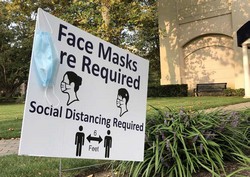President Patrick F. Leahy Ed.D., held an open call for returning students to learn more information regarding the University’s fall reopening plan. The call touched on topics related to COVID-19 safety, student housing, activities, remote learning and more on Tuesday, Aug 18.
Leahy hosted the call “… with the aim to simply give [students] information as complete as [the University] can give, so all students and families can make a good, informed decision about the fall.”
The campus community is still subject to social distancing requirements, mask requirements and other health and safety protocols, Leahy said. “[New Jersey] has not relaxed those at all, and I would argue with good reason.”
Mary Anne Nagy, Vice President for Student Life and Leadership Engagement, was also present in the call, assuring listeners of a full array of programs and activities sponsored by the student activities board, as well as the continuation of greek life and programming in the residence halls.
“The difference is the way that programming is going to be delivered is going to be different than what you might have experienced last year when you came to the University,” Nagy said. “It will be a mix, very much like your academic experience. There may be some small group activities that can happen inside when we can have 25 people or less, which we are allowed by the state.”
There may be opportunities for larger events outside, Nagy said, where “several hundred people” can participate. Fraternities and sororities successfully completed their recruitment and new member intake processes last semester, so “… all of those things will happen in the fall semester as well, it’s just going to be a mix of delivery systems that we’ll be using.”
The University has “plenty of tests available,” according to Leahy, so there will be no issue distributing COVID-19 tests to students should the need arise. A threshold as to how many positive test results would cause the University to close remains to be established.
“I can’t tell you what’s going to constitute an outbreak that would lead us to make some decisions about the fall,” Leahy said. “I can tell you that we are going to aggressively check the symptoms, do the testing, do the contact tracing, and we are going to be very candid about what we’re finding on the campus so that our campus community is well informed.”
Should a student come in direct contact with a COVID-19 positive individual, or someone suspected to be COVID-19 positive, the student will be in quarantine during the wait for results, according to Nagy.
“If the results are negative, the student goes out of quarantine,” Nagy said. “If the student is positive, the student needs to be isolated. We are asking that all students who are isolated, or who are quarantined that live within 100 miles of campus to complete the isolation at home.”

If a student in a class becomes COVID-19 positive, it does not mean the remaining students must be quarantined, Nagy said. “That’s what the contact tracing apparatus will determine, and we will do that in cooperation with the Monmouth County Regional Health Commission.”
Any students who are dissatisfied “….at any point in the semester” with their on-campus housing experience will be allowed to leave housing and receive a refund on a “prorated basis” for any unused portion of room and board from that point until the end of the semester, Nagy said.
“If a student does not decide to start with us and instead wants to defer their housing to the spring, we will guarantee that their room, their building, and their roommate will remain intact for them to come to us in the spring,” Nagy said.
Naser Haroon, a junior Software Engineering major and Student Government Association (SGA) President, “strongly believes” in the effectiveness of Monmoth’s reopening plan.
“The administration has been working tirelessly to make the return as safe as possible for the students,” Haroon said. “There have been many changes made leading into this year, such as ordering food on an app to prevent big gatherings, resident hall restrictions, and so on. This new normal will help minimize the spread of the virus and keep our campus safe.”
Jenna Lee, a junior Health Studies major and Vice President of SGA, detailed some of the organization’s adaptations during the fall semester.
“We had our first meeting last week via Zoom, and it went great,” Lee said. “Navigating the online format can be overwhelming, but our meeting was a success. The president and I are working on holding our meetings outside, or possibly holding a hybrid type of meeting.”
78 percent of classes are synchronous and 22 percent are asynchronous as of Tuesday, Aug 22, according to Rekha Datta, Ph.D., Interim Provost & Senior Vice President for Academic Affairs.
“Since the [last] spring semester we have been spending a lot of time reflecting how we can [have] online classes, adding more quality, adding more communication and looking at it from the student perspective,” Datta said. “This past summer we had a few online academies for faculty, all in preparation for delivering quality online instruction to our students. This is a learning process for everyone and we’re doing our best, whether it’s synchronous or asynchronous.”
Leahy intends to continue with the semester “as is,” intending to finish exams by their traditional time period of mid-December. “We [could] reserve the right at some point, if we feel it is necessary, to empty out the campus a little bit earlier and perhaps shift the remaining couple weeks of the semester online,” Leahy said. “We want to keep those options available to us, but at this point, we don’t want to make those decisions until we enter the fall and get a sense for how things are going.”
PHOTO TAKEN by Melissa Badamo
PHOTO TAKEN by Matthew Cutillo



